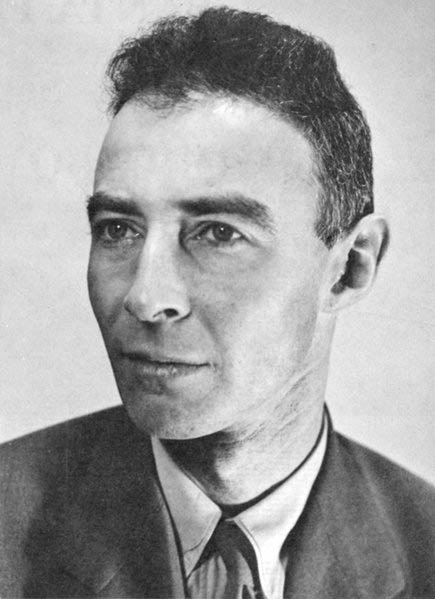
J. Robert Oppenheimer
(1904 - 1967)
Julius Robert Oppenheimer was appointed director of the central laboratory for bomb design and development in Los Alamos, New Mexico, in May 1942, by General Leslie R. Groves, head of the Army Engineers.
Oppenheimer recruited a highly qualified staff of scientists by informing them of the German attempt to create an atomic bomb and of the peacetime uses of atomic energy. His ability to mix with the scientists for open discussions and on-the-spot directions and his ability to apply his knowledge to new situations and theories, were components of his leadership ability.
When the Allies succeeded in removing the threat of a German atomic bomb by their military victories, in 1944, Oppenheimer focused his attention on making the atom bomb to help bring a quick end to the fighting in the Pacific. he also felt that knowledge of the possible devastation from the bomb would force nations to work for peace in the world.
When the atomic bomb was finally used in Hiroshima and Nagasaki, in 1945, Oppenheimer was exhausted and deeply troubled. He resigned as direct of the Los Alamos project. He accepted a professorship at Cal Tech and then in 1946, went to the University of California at Berkeley. He found it difficult to teach as he was constantly being called to Washington for consultation.
He left Berkeley to become the director of the Institute for Advanced Study in Princeton. Albert Einstein was already a member of the non-teaching faculty there. The institute attracted many postdoctoral fellows and it succeeded pre-war Copenhagen as the world center of theoretical physics.
Oppenheimer's prestige grew and he became the spokesman for those who believed that the atomic age demanded a broader understanding of science and technology. He wrote many articles and gave many lectures on this subject. He was largely responsible for the tone and content of the Acheson - Lilienthal plan which was presented to the United Nations as a basis of negotiation for atomic energy control. Together with the Soviet scientists, he concluded that international control was technically realistic and achievable.
Oppenheimer served on many government committees that were related to atomic energy. After the Soviets exploded their first A-bomb, a gap developed between President Truman and his committee. President Truman didn't accept the committee's report negating any ideas of building thermonuclear bombs. This was never made public.
When Oppenheimer's General Advisory Committee appointment expired in July 1952, he remained as a consultant. This was the heyday of Senator Joseph McCarthy with his witch-hunts for communists and he focused in on Oppenheimer, who was not a communist.
Oppenheimer's clearance was taken away. He requested and received a secret hearing which lasted from April 12 to May 6, 1954, during which distinguished scientists and public servants testified on his behalf The hearing concluded that Oppenheimer's loyalty was not in question but it would be unwise to trust him with official secrets.
Oppenheimer remained as director of the Institute for Advanced Study in Princeton until he resigned in 1966. He died in 1967. Oppenheimer was an outstanding Jewish physicist of the 20th century. His development of the A-bomb and his writings and lectures on atomic energy are a testimonial to his greatness.
By Seymour "Sy" Brody
Courtesy of:
http://www.jewishvirtuallibrary.org/jsource/biography/Oppenheimer.html
